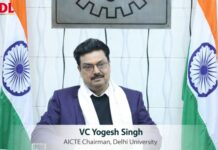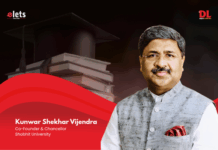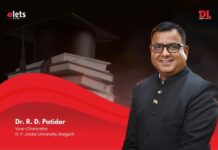 Guru Harkrishan Public School, Vasant Vihar, New Delhi, is not just a school, but an institution with a vision of fostering an environment where children are free to learn not just the basic skills and concepts but also discover and develop their hidden potential. As enshrined in the school`s motto `Vidya Vichari Tan Parupkari`, meaning he is learned who does good to others, the aim is to produce ideal members of the society
Guru Harkrishan Public School, Vasant Vihar, New Delhi, is not just a school, but an institution with a vision of fostering an environment where children are free to learn not just the basic skills and concepts but also discover and develop their hidden potential. As enshrined in the school`s motto `Vidya Vichari Tan Parupkari`, meaning he is learned who does good to others, the aim is to produce ideal members of the society
In what ways does GHPS render excellence in all aspects of education?
The school is dedicated to providing the highest possible levels of excellence in all aspects of education including academic, culture and ports. Guru Harkrishan Public School is not just a school, but a movement with a vision to nurture the future. It creates an environment where the child is free to learn not just the basic skills and concepts but also discover his hidden potential and develop it to ts fullest extent. It strives to create situations which extends his field of vision so that there is an awareness of the future and a sense of readiness to face the world. Responding to a very important social and educational need, the school has introduced a scheme of special education for children with learning disabilities. The objective of the scheme is to help such children overcome their learning deficiencies and gradually integrate their education with the mainstream by providing a congenial environment as well as using specialised and scientific techniques.
What pattern of curriculum isfollowed by the GHPS?
The school follows the pattern as laid down by the Central Board of Secondary Education with some modifications. e have a provision to keep Punjabi as an optional language in Class 10 CBSE examinations. Divinity s taught as a compulsory subject in all classes. Introductory computer education is given to all students from Class I-VIII. Information Technology as a subject has been introduced as per CBSE norm in Classes 9 and 10, if a student shows aptitude he/she can keep it as an optional subject too Can you elaborate on ‘Divinity’, which orms an integral andessential part of the school curriculum?
Along with scientific education, we also endeavour to impart a sound sense of spiritual values based on glories. Divinity is an integral and essential part of the school curriculum. All students are required to undergo a course in ivinity, which is treated as a regular subject. Apart from classroom teaching, students are encouraged to participate in various competitions in Gurmat quiz, declamation, Gurbani recitation and kirtan, and religious trips to historical places.
What initiatives have been taken by the GHPS for integrating ICT in its system?
In the present day scenario we cannot do away without integrating information and communication technology in our curriculum. Our school is taking various initiatives to install ICT system in the campus. Recently we entered nto a collaboration with a private company on trial basis and would install and implement ICT system in ur classes in due course of time. It is proves successful, we would further upgrade it. We also use SMS’s while conveying information to the parents of our 3000 students.
How do we see the impact of ICT integration in teaching learning process?
The ICT integration in modern system of education has enhanced the motivation, concentration and effectiveness of a teacher. The focus now is on the student rather than the teacher. With ICT, it is learning by doing, seeing and observing. This transformation shall bring in better learning techniques, be more gainful with its stress on creativity and problem solving, develop reasoning and communicative skills, etc. Integration of ICT is known to have a positive impact on students achievement and motivation. In your view, what major challeges are likely to be encountered while integrating ICT in school education? The hurdles or challenges varies from school to school and also depends on the location of the schools, that is whether it is in an urban or rural area. Some of the immediate hurdles faced are:-
a) Educational technology courses are taught in a rather traditional way and shows less proof and evidence of implementing in some schools
b) The lack of trained and qualified teachers to work in common schools owing to various reaasons
c) Lack of availability of proper infrastructural facilities in most of the institutions
d) Lack of budgetary planning and interest of the school managements as well as of that of the head of the school in some cases
e) The mismatch between available hardware and software to develop the required learning resources
f) Lack of availability and supportfrom the technical staff as well as for the fear of experience cost of maintenance.
g) The time duration of these ICT educational courses are too short to inculcate knowledge amongst the students and it need to be improved so that maximum students are benefited
h) The syllabus of education is not as per ICT system and is given less emphasis in using computer based knowledge
i) ICT basics are taught to teacher trainers focusing on technical parts only and hence some schools have shortage of trained staff members in information technology How can capacity of teachers be built in rendering technology
mediated education? Schools play an important role in imparting effective and quality education. The major challenge is to have trained staff with missionary zeal with skills to impart ICT education;
infrastructure; finance; separate laboratories as well as the interest to introduce it in a congenial atmosphere. Teachers already engaged should be made to go in for compulsory training and refresher courses in IT so that ICT could be implemented most efficiently. All institutions must encourage teachers to learn computers, the latest in information technology and encourage inter-school seminars, workshops as well as various periodical refresher courses. We need to develop amongst the teachers the ‘will to learn, will to do, and will to acquire .
























